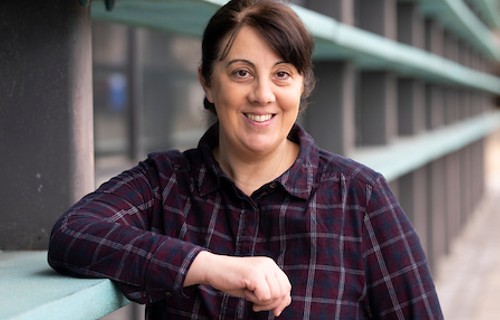
Lecturer / Assistant Professor (Ad Astra Fellow)
Anita is an Assistant Professor and Ad Astra Fellow at UCD School of Archaeology. She is developing novel techniques to track the artists and craftspeople of ancient times by their skeletal remains. Through this work, she is helping to reveal the hidden roles of women in arts and crafts in the past.
By analysing the tiny remains of dust in dental plaque on people’s teeth, she is uncovering more about artists' lives. Her radically pioneering line of research has potential to answer fundamental questions about the lifestyles and environmental contexts of past populations and has important implications for society today.
A unique discovery by Anita and her colleagues in 2019 helped to illuminate the role of women in mediaeval crafts and to challenge the widespread assumption that male monks were the sole producers of books in the Middle Ages.
In collaboration with the Project Partnership for Heritage (PIs Prof Anna Leone and Dr Lisa Mol), she also works closely with modern day craftswomen who master and uphold ancient skills in remote areas of North Africa (Tunisia and Libya). Through this project they are documenting textile production and the use of colours and other crafts. Many of these ancient traditions have developed and adapted in respect of the environments over time. In keeping such traditions alive, women around the world are contributing to a more sustainable future.
With a fascination for Human-Nature interactions and Human Built Environments and their changes through time, Anita also works in Archaeology and Heritage Protection in extreme environments, conflict and post-conflict zones.
It fills me with pride to see women around the world contributing to a more equal, inclusive and fairer academic world.
In February 2023, Anita was awarded the very prestigious Dan David Prize, the largest history prize in the world. Having studied Natural Sciences first in her native country Italy, she arrived at Archaeology later in life as a mature student.
"When people see a Prize or a Grant being awarded, they see the successful part of a story. The many paths that lead to that are rarely told. I arrived in Archaeology later in life, after being told repeatedly as a young girl that if I pursued Archaeology I would be jobless. I am not a native speaker and I am partially deaf, all of this contributed to me conducting my studies from undergraduate to PhD self funded and part-time while working."
Although she did not initially aim to pursue an academic career, she was passionate about learning new things and continuing her education.
"I was motivated by the fact I was doing something I really loved and by the belief that the Humanities can collectively make our future better. Hence I have a strong belief in the value of lifelong learning and continuing education, to which I am truly committed these days. As a mature person competing for junior positions, and being a non-native speaker with a hearing impairment, I have often lacked confidence and I had little hope of landing academic jobs. I was overwhelmed with joy when I was offered the Ad Astra position at UCD, where I have found an environment genuinely committed to equality and diversity."
While Anita believes that much progress has been made over the years in terms of research culture and academia, she says there is still a long way to go.
"I believe this is a wonderful moment to study and do research, as barriers among disciplines are falling, allowing interdisciplinary work to happen at an unprecedented scale. The academic environment is improving, at least since I started my studies, and I now do not feel that my hearing issues are a big issue, especially here at UCD. Things are getting better, at least in our part of the world, but we are far from where we should be. We need to keep going, embracing diversity of peoples, of cultures and ideas. It fills me with pride to see women around the world contributing, at great cost, to a more equal, inclusive and fairer academic world."